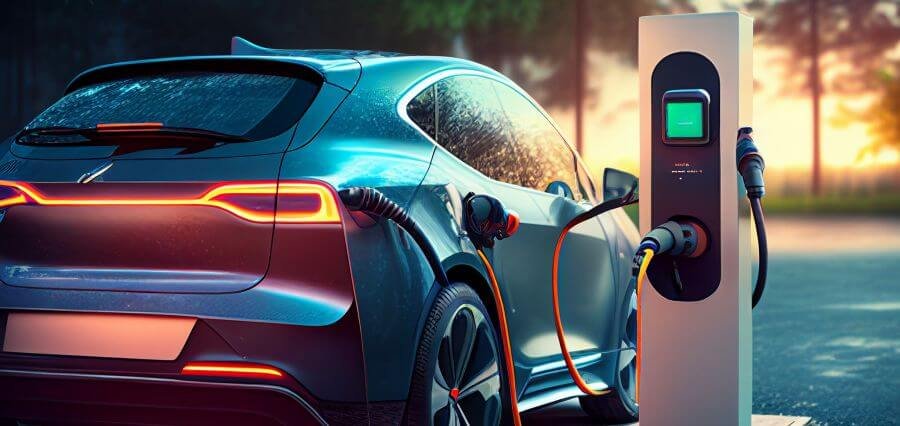Promoting Sustainable Living
The transportation sector has long been a significant contributor to global carbon emissions, which have, in turn, driven the current climate crisis. With an increasing focus on sustainability and environmental protection, governments, industries and individuals are exploring alternatives to traditional fossil-fuel-powered vehicles.
Among these, electric vehicles (EVs) have emerged as a key solution in reducing emissions and promoting sustainable living. Electric vehicles use electricity stored in batteries to power electric motors, as opposed to internal combustion engines that rely on gasoline or diesel.
Electric vehicles have become synonymous with a shift towards green energy and the reduction of carbon footprints, acting as a crucial pillar in global efforts to transition away from fossil fuels.
These vehicles not only represent a cleaner mode of transportation but also signify broader changes in energy consumption patterns, including the rise of renewable energy sources. As electric vehicles pave the way for a greener future, they play a pivotal role in promoting sustainable living, providing both environmental and economic benefits.
This article will explore how electric vehicles are leading this transformation, analyzing the environmental, economic and social impacts and look ahead to the future of sustainable transportation.
Environmental Benefits of Electric Vehicles
Reduction of Greenhouse Gas Emissions
One of the primary reasons electric vehicles are heralded as the future of sustainable transportation is their ability to drastically reduce greenhouse gas emissions. Traditional vehicles powered by internal combustion engines release large amounts of carbon dioxide (CO2), a leading contributor to climate change.
In contrast, electric vehicles produce zero tailpipe emissions. When powered by renewable energy sources, such as solar or wind, EVs can operate without contributing to atmospheric carbon levels at all. This shift plays a critical role in promoting sustainable living by reducing the transportation sector’s overall environmental footprint.
Moreover, life cycle analyses of electric vehicles show that, even when accounting for the emissions generated during the manufacturing process, EVs produce fewer total emissions over their lifetime compared to their gasoline counterparts.
As renewable energy infrastructure continues to expand, the environmental benefits of electric vehicles will only increase, further paving the way for a greener future.
Improvement of Air Quality
Air pollution, particularly in urban areas, is another significant issue linked to traditional vehicles. Internal combustion engines emit not only carbon dioxide but also harmful pollutants such as nitrogen oxides (NOx) and particulate matter (PM), which contribute to smog formation and respiratory illnesses.
By adopting electric vehicles, cities can dramatically improve air quality, leading to healthier populations and cleaner environments. Electric vehicles are already being integrated into public transportation networks in cities around the world, a trend that will accelerate as the benefits of cleaner air become more apparent.
Conservation of Non-renewable Resources
The widespread adoption of electric vehicles also contributes to the conservation of non-renewable resources. The fossil fuels that power traditional vehicles are finite and will eventually run out.
As demand for oil decreases due to the rise of EVs, there is a concurrent reduction in the depletion of these limited natural resources. Additionally, the transition to electric vehicles aligns with the broader movement towards renewable energy, further promoting sustainable living by encouraging the use of abundant and clean energy sources like solar and wind.
Economic Impacts of Electric Vehicles
Lower Operating Costs
One of the key incentives driving consumers towards electric vehicles is their lower operating costs. While the upfront price of an electric vehicle can still be higher than that of a traditional gasoline-powered car, the total cost of ownership is often lower over time.
Electric vehicles typically have fewer moving parts, which results in reduced maintenance costs. Furthermore, electricity as a fuel source is generally cheaper than gasoline, allowing EV owners to save money on fuel over the vehicle’s lifespan.
In addition to individual savings, the broader adoption of electric vehicles can lead to macroeconomic benefits. As nations reduce their reliance on oil imports, they strengthen their energy independence, creating more stable and self-reliant economies.
This economic shift aligns to promote sustainable living by encouraging investment in local, renewable energy infrastructure.
Job Creation in the Green Economy
The electric vehicle industry has also become a key driver of job creation in the emerging green economy. As the demand for EVs rises, so does the need for skilled workers to manufacture, maintain, and innovate in the field.
This includes not only jobs related to the vehicles themselves but also the infrastructure that supports them, such as the installation of charging stations and the development of battery technology.
The growth of this sector demonstrates how electric vehicles are paving the way for a greener future by fostering a sustainable economy that benefits both people and the planet.
Social Impacts and the Promotion of Sustainable Living
Increased Public Awareness
The growing popularity of electric vehicles has also played a significant role in raising public awareness about climate change and sustainability. As more people adopt EVs, conversations about renewable energy, carbon footprints, and environmental responsibility become mainstream.
Electric vehicles serve as a tangible example of how individuals can make lifestyle changes that contribute to a greener planet, promoting sustainable living through everyday choices.
Encouraging Technological Innovation
The rise of electric vehicles has driven advancements in battery storage and renewable energy integration, crucial for both EVs and intermittent energy sources like solar and wind. Innovations in EV design, such as autonomous driving and smart grids, promise a greener, more efficient future in transportation.
Energy Efficiency and Mobility Solutions
Electric vehicles offer significant improvements in energy efficiency compared to traditional vehicles. For instance, electric motors convert more energy from the battery to movement than internal combustion engines do from fuel.
This higher efficiency directly contributes to the promotion of sustainable living, as less energy is wasted and fewer resources are consumed. Additionally, electric vehicles are often paired with emerging mobility solutions, such as ride-sharing and car-sharing services, which further reduce the overall environmental impact of transportation systems.
Challenges and Future Prospects of Electric Vehicles
Overcoming Infrastructure Challenges
One of the main barriers to widespread electric vehicle adoption is the lack of adequate charging infrastructure. To fully capitalize on the environmental benefits of EVs, nations and cities need to invest in expanding charging networks, especially in rural and underserved areas.
Overcoming this challenge will be key to ensuring that electric vehicles can pave the way for a greener future on a global scale.
Innovations in Battery Technology
As the demand for electric vehicles grows, there is an increasing need for advancements in battery technology. Current lithium-ion batteries, while effective, have limitations regarding range, charging time, and environmental impact.
Future innovations, such as solid-state batteries or improved recycling methods for used batteries, will play a vital role in enhancing the sustainability of electric vehicles and further promoting sustainable living.
Recapitulation
Electric vehicles are undeniably paving the way for a greener future, playing a central role in promoting sustainable living across multiple sectors. Through reductions in greenhouse gas emissions, improvements in air quality and the fostering of a green economy, EVs are helping to mitigate some of the most pressing environmental challenges we face today.









